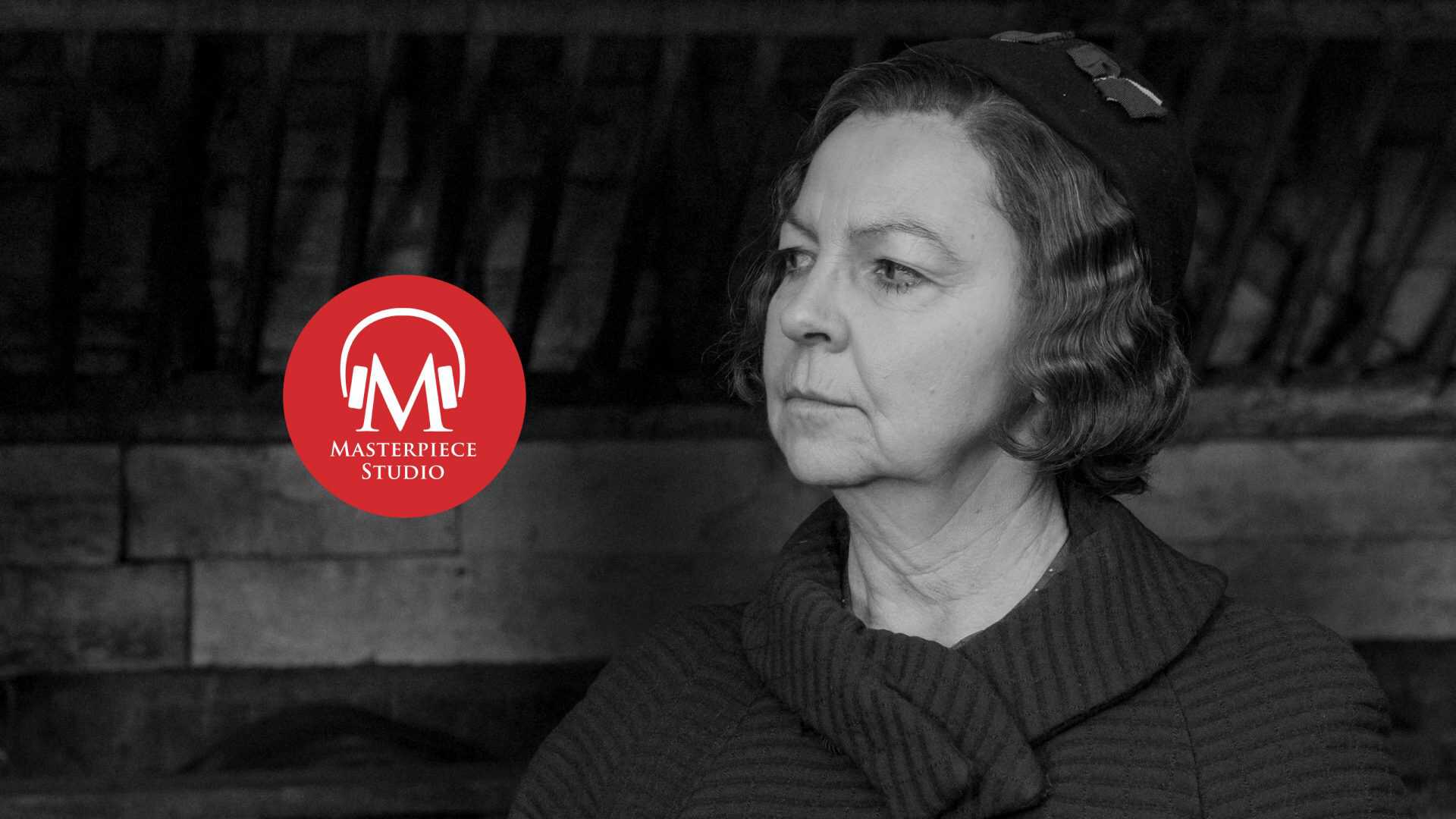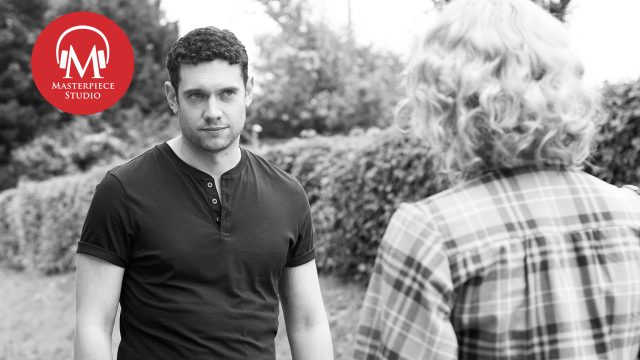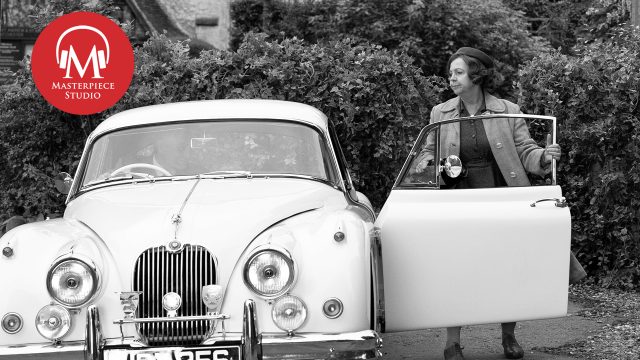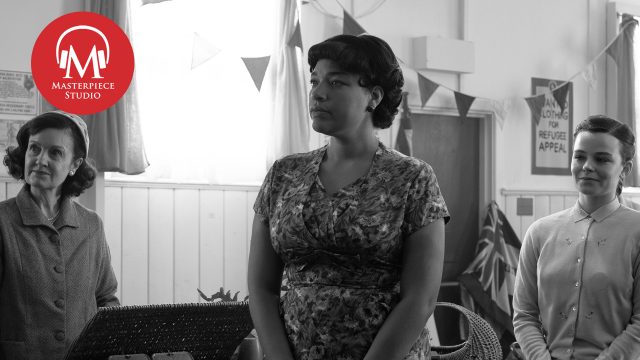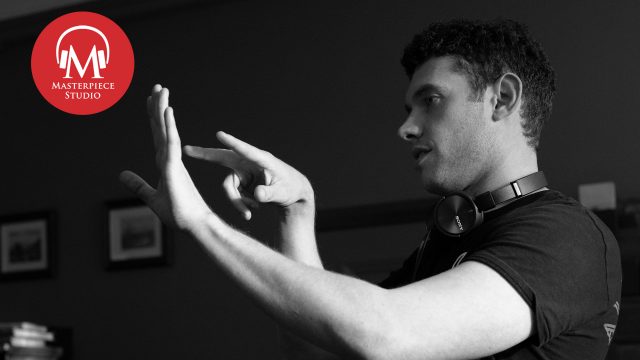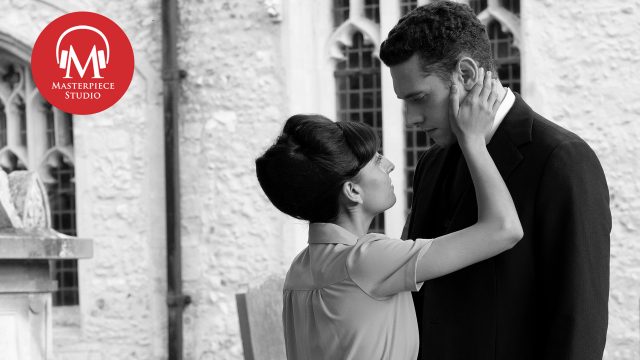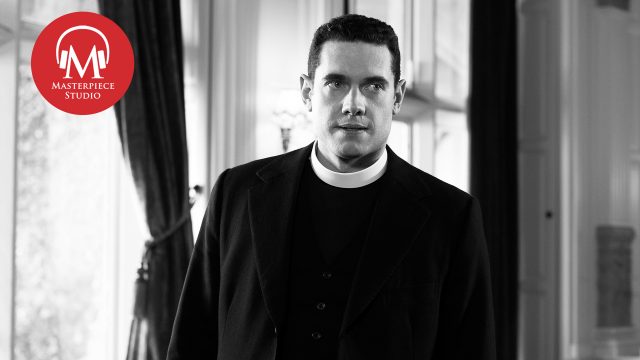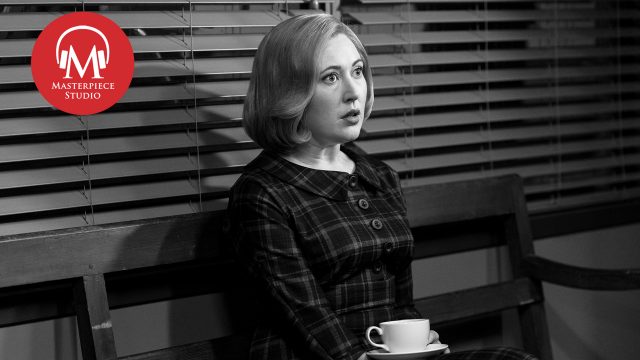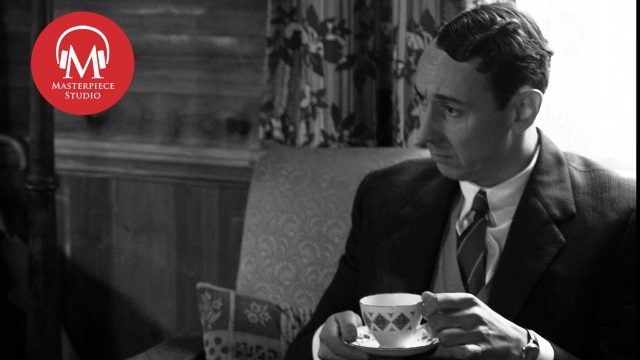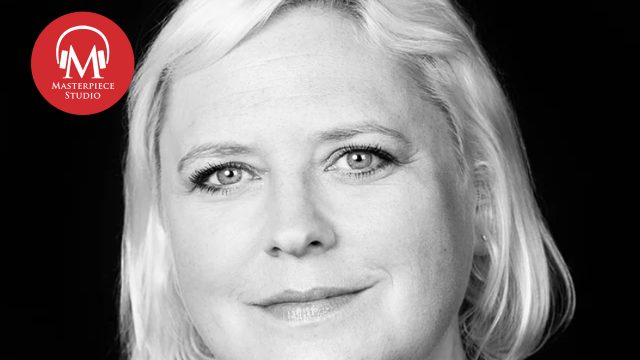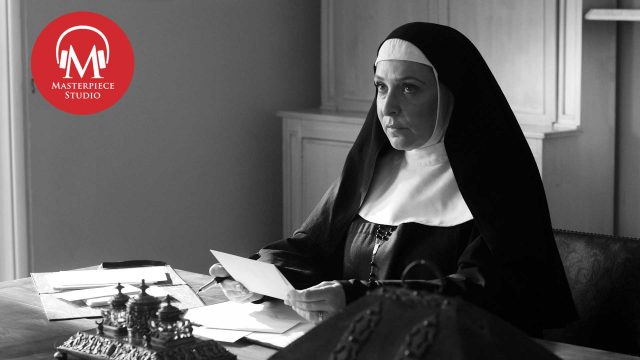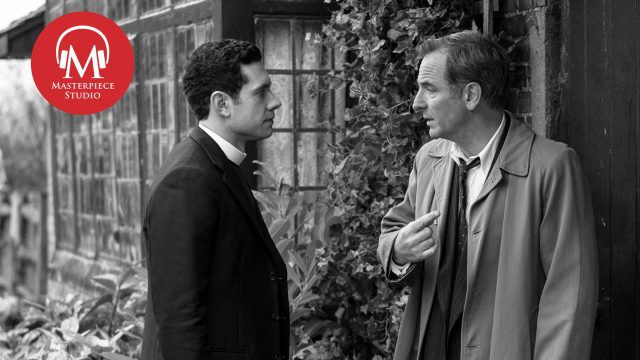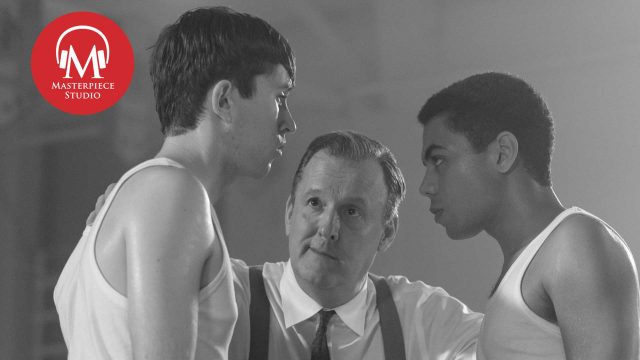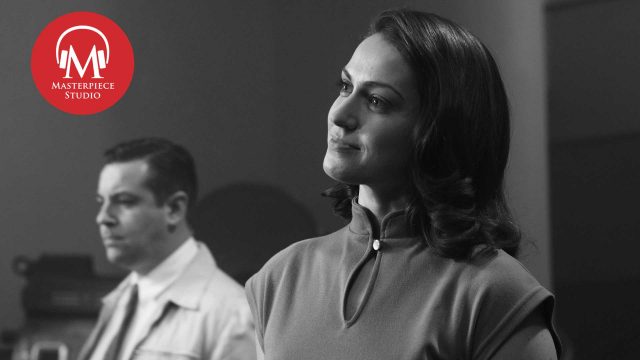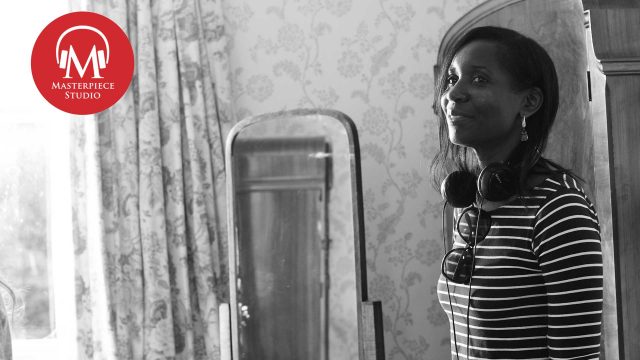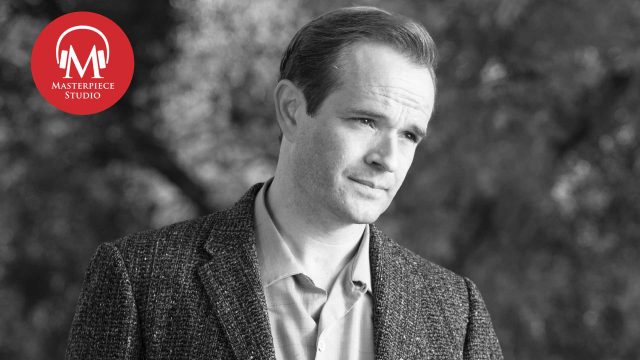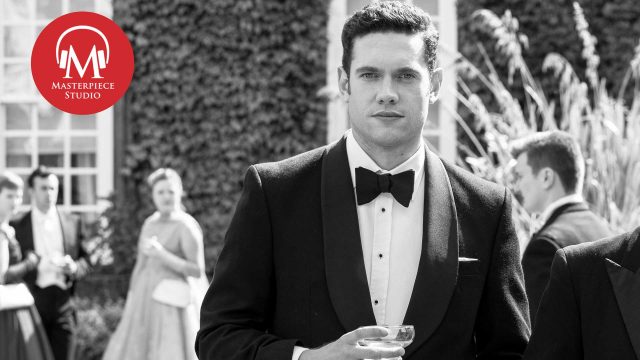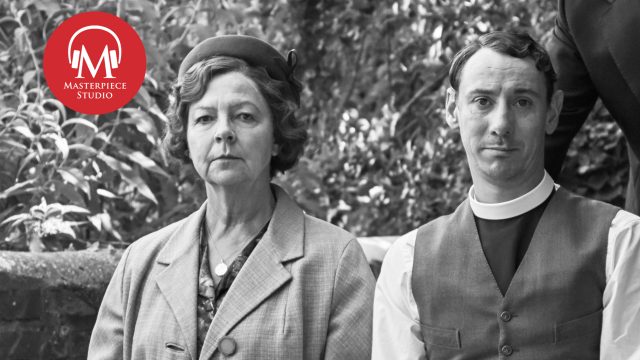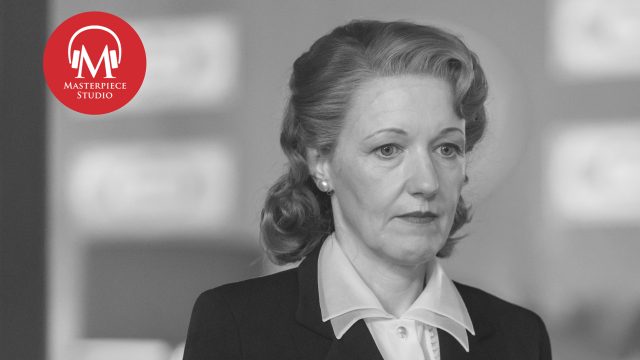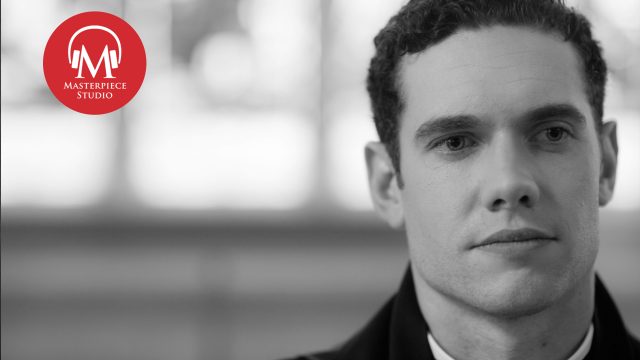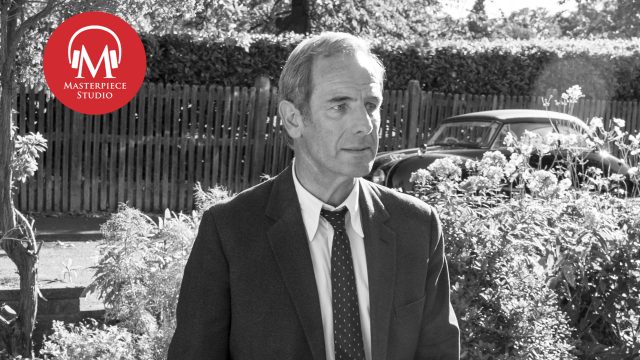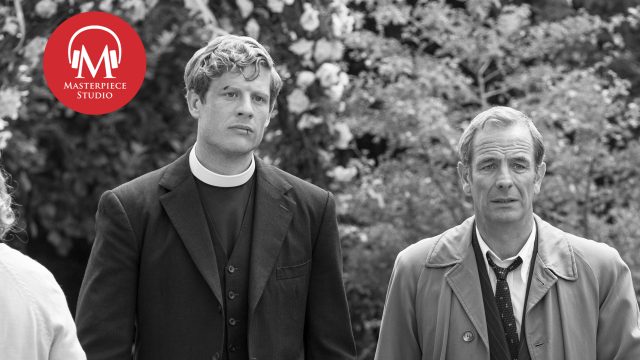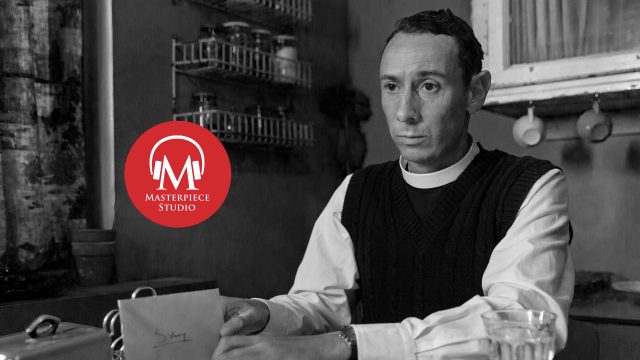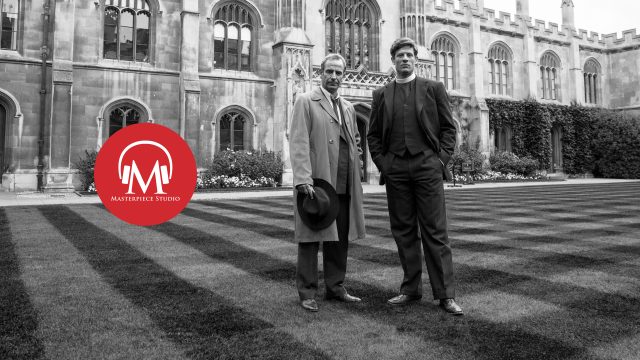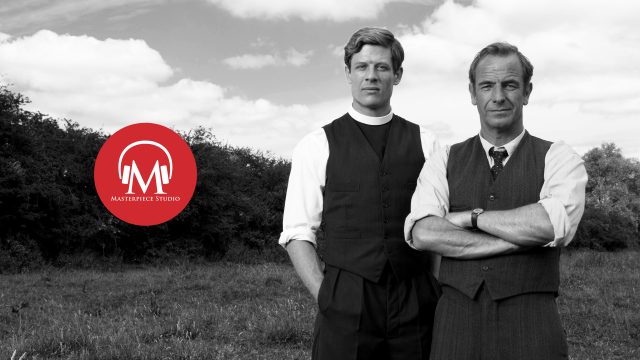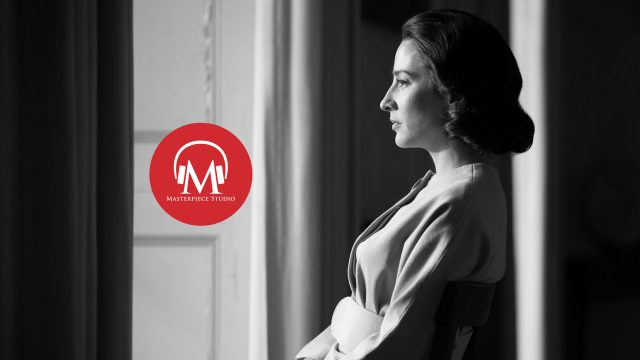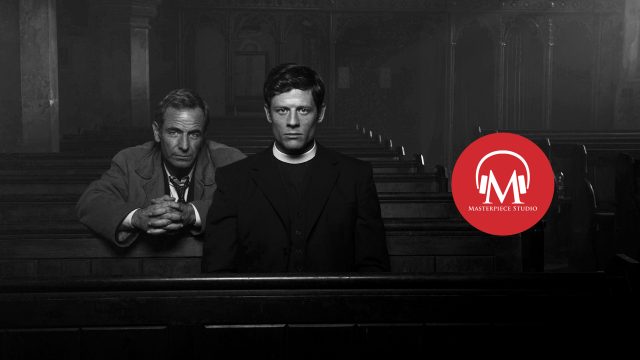Jace Lacob: MASTERPIECE Studio is brought to you by Viking Cruises. See the world differently by exploring differently. Learn more at vrc.com.
I’m Jace Lacob, and you’re listening to MASTERPIECE Studio.
Ever since the first season, the biggest mystery in Grantchester was not “who stole Amanda’s wedding ring?” or “who killed the policeman slash landlord slash factory worker?” but rather “Who is Mrs. Maguire?”
CLIP:
Mrs. M: Do you remember what I told you about my family? That my brothers died in the first World War?
Sidney: And your Ronnie disappeared for no good reason in the second? You’ve told me at least once a week for as long as I’ve known you.
Jace: Sidney and Leonard’s dour housekeeper has always kept us guessing. One minute, Mrs. Maguire’s chasing Amanda out of the house; the next, she’s inviting Amanda and baby Grace to live in the upstairs bedroom.
And then of course there’s the mystery of Mrs. Maguire’s supposedly dead husband.
CLIP:
Tessa Peak-Jones: I think probably it was quite a harsh marriage. I don’t think either of them probably behaved very well.
Jace: In the latest episode, we finally get some answers about the mysterious Ronnie Maguire, and Mrs. M’s hidden past.
Tessa Peake-Jones joined us to talk about her character’s surprise dramatic rise this season and her relationship with former acting school mentee Al Weaver.
Jace: This week we are joined by Grantchester star Tessa Peake Jones. Welcome.
Tessa: Thank you.
Jace: In the script for the first episode of Grantchester, Mrs. Maguire is described as quote, “A small religious rather aggressive woman.” What did you make of her initially when you read the script.
Tessa: Well that you know that alone to an actress is just like gold dust when you read, because you know, particularly the sort of part I normally play are friendly, smiley people who are kind and gentle. So, when I read that I thought, ‘Wow. This is a complete departure for me not to smile,’ for almost three years-worth of Grantchester. There are perhaps two, three occasions over three years where Mrs. Maguire smiles and that is just gold dust for an actress because it’s a joy. So, when I read that stage direction I thought, ‘This is going to be good fun.’
Jace: Well you’ve described yourself as a big smiler, as you say, and her sternness would seem to be at a very sharp contrast with your own personality. Is it difficult to keep that sunniness in check when you’re playing Mrs. M?
Tessa: Yes, it is quite hard because obviously over the three years that we’ve been together as a team you know we’ve got to know each other very, very well. We all hit it off in sort of series one, episode one. But therefore, you know, it’s great fun as well as being a challenge to act. It’s also great fun to work with these people and when you’re having fun, you know, you tend to smile or laugh. So yeah, I had to remind myself on the takes to concentrate very hard on being serious. But the rest of the time it was very nice to smile because otherwise you know your face gets rather set, and people have said to me in real life, ‘Why do you, how come you look so old and ugly?’ Which of course they mean well, but isn’t great to hear. And I’ve tried to explain that actually if you look disgruntled and you frown a lot your face becomes much older. You know, you get lines everywhere. So, the reason I look sort of very different I think and older and uglier is because I’m frowning so much in it.
Jace: Is there any part of Mrs. M’s character that you see within yourself?
Tessa: Well I’m going to say no, aren’t I, because of the sort of woman she is. But, of course, you start — when I was asked this the other day actually about a stage play I’ve just been doing. And they said, you know, ‘How do you find your part?’ Well, of course you know as I said then, ‘You start with yourself.’ So yes, you’re using bits of yourself all the time and then you’re adding other little bits of things, like a magpie that you’ve picked up along the way. So yes, some are. Some of Mrs. Maguire is inevitably me. But I think the bits that aren’t me that were the challenge to play are things like that being very serious and the never smiling that that you know — not showing her heart on her sleeve which I tend to do in life, as Tessa. You know, those bits of Mrs. Maguire were bits I had to sort of search for and find you know and as I say get very concentrated before I take so that I knew I was in the right sort of zone for it.
Jace: We’re approaching the end of the third season now. Looking back how would you describe Mrs. M’s character arc thus far?
Tessa: Well it’s been a lovely arc, really, because in series one we were getting to know of course all the characters but she had a very sort of, a maternal feeling toward Sidney whilst also trying to keep him in check. But she was also quite lonely because her husband had gone off after the war and hadn’t returned, and she I think thought he’d died. You know, it was never really mentioned, but I think the assumption was that he was missing, presumed dead. And that ran right through one. Of course, in series two, she became more and more involved in that in the fact that she didn’t think Sidney should be getting quite as involved with Amanda and was also seemed to be trying to get away from Amanda and have other relationships which again, she didn’t approve of. She wasn’t sure about Leonard. She took time to get to know him. And then in series three they focused far more on each person’s duty. Duty vs. love, I think has been this series is sort of key words. And for her, the loneliness that she’s suffered, she suddenly you know decides she’ll go to go ahead and have this, a companion. And we watch that developing. And also of course, we’ve discovered what’s happened to Ronnie, and that’s been a huge shock for her. So, the arc’s been great and it continues into this last episode as viewers will see. But it’s been, it’s been lovely. It’s been a great emotional journey for her as well as her normal endearing qualities and keeping an eye on the vicarage and the vicar than all the other things.
CLIP
Rosie: Can I help you Sylvia?
Mrs. M: Lardy cake.
Rosie: Wonderful! Let’s hope it’s a bit more popular…than last year.
Mrs. M: Miss Franklin here has made sausage rolls.
Hilary: They’re nothing really.
Mrs. M: They’re delicious. And Mrs Hopkins has made a Victoria Sponge.
Rosie: Oh that’s lovely! Err but we do have…so much cake. Are you sure you don’t want to save it for your husband?
Mrs. M: Mr Hopkins is away on business.
Jace: Speaking of keeping an eye on the vicar, so Mrs. M began the season trying to scare Amanda off from a relationship with Sidney, but she eventually becomes a rather caring, almost doting maternal figure towards Amanda and Grace. How would you describe the dynamic between Sylvia and Amanda this season?
Tessa: Well I think again that’s grown it’s been a bit of a come at a tussle which I think Morven, playing Amanda would agree. You know throughout the three years there’s been a bit of a hit and miss, hit and miss. But I think because of the baby it’s sort of opened up all sorts of things for Mrs. Maguire who never had children. So, for her I think to be used as a babysitter and a you know, a sort of, a surrogate grandmother, because Amanda has no family now. I think that touched Mrs. Maguire in her own loneliness to see that Amanda really hadn’t got anyone to help. She’s been living very nearby in the village. And mainly, I think the little baby has brought them together and although I think she feels again it’s this duty love, she feels that really you know for Sidney’s sake this relationship cannot go on between Amanda and Sidney. She also sees that that Amanda and Sidney are in love, that there’s a baby, you know, so she’s very torn about that and I think, I think yes, they’ve become closer and closer which has been lovely because Morven and I have never had that much together in scenes and this year we have, which has been bliss.
Jace: I love the relationship, too, between Mrs. M and Leonard. If Sidney is the son she never had, who is Leonard to Sylvia?
Tessa: Well I don’t know I suppose maybe I would say godson. I don’t know, or possibly even other son. You know I mean for all again for all her ‘Tut tut tut’ and religious and rather old-fashioned views, I mean I think she’s known all along that he’s gay and she’s brushed that aside. You know she made a few comments about it in the first series when he arrived. And I think wasn’t very sure what to make of him. But that’s now been moved on one side and he lives at the vicarage and she sees that he does a good job as a curate and he’s a good support to Sidney and she’s become very fond of him and I think I think it I suppose he is like another son, yes.
Jace: When we first met Mrs. M and Sidney there was a contentious nature to their relationship with Mrs. M largely disapproving of almost everything that Sidney did. His drinking, his jazz, his women, etc… How would you describe the rapport now especially after what he did for her in this episode?
Tessa: I think the relationship has deepened and is far more mother-son now. I think she still will take the opportunity as she does to point out where she feels his duty is lacking, particularly again with his love life. And I think that will continue because I think she feels that’s part of, you know, who she is and what she brings to the relationship is to try and keep him on the straight and narrow. And she still gets irritated by the loud music and the whisky drinking you know none of that has gone. It’s just that we haven’t focused on it quite so much. But I think there’s certainly a tenderness now that has developed. As with any friendship, you know, the years go by and with each year you know you become close to somebody and therefore more tender, don’t you?
Jace: And she’s the one that is able to sort of get to Sidney and get him to wake up as it were to come back to Grantchester.
CLIP:
Sidney: It was better for everyone that I left. I’m like Ronnie.
Mrs. M: You are nothing like Ronnie Maguire. Ronnie ran away from a marriage that was over. But you, Sidney Chambers, just need to grow up. Come home. And let’s hope the water’s hot at the vicarage! I rather think you’d benefit.
Tessa: You know, it is a two-way relationship and much as you know she would listen to him if he was advising certain things for her; I think he does listen to her. And I think she sort of does make it clear that you know he is very much needed in the church, not just by God, but actually more importantly, I think she feels, by the congregation, by the very people he’s serving and I think that, that rings home to Sidney.
Jace: You’d worked with Robson Green on an episode of “Casualty” and a very naked James Norton on the indie film “Bonobo.”
Tessa: Ha, ha, yes.
Jace: Did that, did that familiarity help in terms of creating a shorthand between the cast quickly?
Tessa: Yes, it always helps. I’d also worked with Al Weaver because I was his mentor in his final year at Guild Hall drama school. It always, always helps when you’ve, I mean it’s not to say that when you meet someone for the first time because we’re actors we have to get on with it straightaway. We jump in the deep end, so you’re always going to have, you know, within a matter of hours some sort of shorthand because that’s what actors do. They couldn’t work if not, but it certainly helps to have had some sort of relationship with actors before. Because apart from anything you’re not spending a lot of time getting to know each other, which you would do normally. And, of course if you’ve already worked with them, then you can jump straight into that next gear which is lovely.
Jace: Even if it’s naked calisthenics with James Norton.
Tessa: I mean it’s funny because when we worked together on that James wasn’t known. So, you know it was just one of a team and now you know the only thing that people seem to say, particularly middle-aged women friends of mine, is ‘Oh my God what was it like!’ You think well you know you were just getting on with it because that was the film, you know you didn’t sort of take on…Actually, everyone in it was naked so it was sort of no different to anything else but it’s very funny how that’s now developed.
Jace: You mentioned you were a drama school mentor for Al Weaver. What was he like as a drama school actor? What do you remember about him?
Tessa: Well, he was brilliant. I mean but then Guild Hall is a really good drama school. I mean he was very, very good. I did very little with him. I mean you were mainly the job I was doing was coming in on their final year as they’re getting ready to leave and you were there to advise them really about agents, audition speeches, whatever, and you had to do about six hours per term with them just working on their audition pieces and he was always you know way ahead of it all he was prepared. He’d done it all every time he did it you know, I couldn’t think very much to give him notes wise because he was so good and he got a job within minutes and an agent you know so he was lucky but then he was a very talented actor and it’s been lovely watching you know I’ve gone occasionally to see stuff he’s, and now to you know to be coming full circle and actually working with him is just a joy.
Jace: On last week’s show, Al told me that he once mentioned to you that he wished you had more lines and you told him, ‘Al, my favorite acting is listening acting, thinking acting. It’s what you say with your eyes.’ What do you mean by listening acting or thinking acting.
Tessa: Well yes, I do like to say that, because I’d had enough of his moaning. My favorite acting is not speaking. That’s my favorite, not speaking. I mean lovely to have the lines and that’s great and of course you do them as well as you can. But for me, and what I always look at when I see other people’s performances on stage or on film, I watch them when they’re listening and not speaking because that’s what I just feel that’s when you get to know somebody incredibly well is when you’re seeing how they react to what is being given to them. So, for me, that’s my favorite bit of acting, is, is receiving from somebody else the lines, and then thinking about it before I then reply and that’s what I meant by that for him, and I think that’s I was just trying to say that you know there’s as much to be got out of the listening as there is, you know, even if you’ve got only a few lines in a scene. You can be travelling miles emotionally just by how you listen.
Jace: Al said that you’re brilliant. By the way.
Tessa: Oh, thank you, bless.
Jace: He also said that you were a quote incredibly loud walker and prop maneuverer. Care to refute that description?
Tessa: I think he means my heels that make a noise, and that’s not my fault it’s costume; and I’m not terribly good with props, and I do tend to clatter the cups and saucers usually over other people’s lines I think that’s what he means deliberately in his case because sometimes he’s very naughty and starts giggling, so one has to just put him in his place.
Jace: How much mischief do the boys as I’ll call them get up to on set?
Tessa: They can be very naughty. And obviously when we’re actually finally doing the take and we know it matters then everyone behaves and gets on with it and we take it very seriously. But there was one occasion, which am sure they may have mentioned to you where James and Al had to be asked to leave the house altogether because all I had to do was walk in. I had to open a door and find them, and look shocked. Well, I couldn’t do it because every time I walked in there they were just creased up with laughter. So, in the end the director said, “I’m terribly sorry boys, you’ve got to leave because we can’t get on.” And they were sent out, and I could still hear them outside on the driveway laughing, so it didn’t help a great deal. So, at those times, you know, become things of stories of myths you know that we will then be telling I’m sure our children in 30, 40-years-time. But on the whole normally, they were very, very good.
Jace: Let’s take a quick break and hear from our sponsors
MASTERPIECE Studio is brought to you by Farmers Insurance and their eighty-eight years of experience helping people so that they can prepare for the unexpected. They know a thing or two because they’ve seen a thing or two. Find an experienced agent at Farmers.com.
MASTERPIECE Studio is also brought to you by Viking Cruises, exploring the world in comfort. Learn more at vrc.com
Jace: You mentioned the mysterious Ronnie, one of the show’s central mysteries has been what happened to Mrs. M’s husband, who vanished during World War II, and he finally turns up out of the blue alive and well. I mean, do you think that she did sort of grieve for him as though he had died during the war?
Tessa: I think possibly. I’ve never been in this position but I feel that when you know someone is missing in your life and there’s no explanation I suppose 90 percent of you might say, ‘Well actually, you know, yes he’s he’s died,’ but that must be a little bit of you that secretly hopes that one day he’s going to walk back. And I think that’s exactly what happens with her. Although it’s a great shock.
Jace: Now before his return Ronnie is referred to as a rotten apple by Mrs. M, but she also kisses a locket that contains his picture, which seems at odds with that portrait. What do you feel their marriage was like?
Tessa: Yes, this is a tricky one it’s one we discussed actually with Charlie, who played Ronnie, before we filmed. I think probably it was quite a harsh marriage. I don’t think either of them probably behaved very well. I think we came to the agreement that he probably drank quite a lot and perhaps went missing every now and then, and you know, didn’t behave very well, maybe even was a womanizer, who knows? And I think she, perhaps, was quite cold towards him and not quite the you know normal wifely woman that because of her religion and because possibly of her upbringing; I’ve always thought she had probably quite a harsh childhood which has led her to be the way she is now finds it hard to show sort of love openly, and kindness openly, was possibly from not having a very kind childhood herself. So, she was probably not ideal as a wife either. I don’t think it was the greatest marriage in the world.
Jace: There’s a beautiful sadness to the scene where Ronnie and Sylvia dance, a moment that does recall a time where they perhaps were happy together. What was it like playing this moment with Charlie Higson?
Tessa: Oh, it was absolutely gorgeous because he’s a lovely, lovely actor to work with. And it was lovely because I think it’s important in again in those arcs of seeing characters develop, that you know you get the feeling he has been a rotter and she has had a bit of a miserable time, and that this even him turning up again is going to be questionable. But to see a little tiny flutter of what their lives were like years and years before, when they perhaps first met and did go dancing. I think that’s lovely because it just introduces that element even though you’re not really seeing it all the time now.
CLIP:
Mrs. M: Only you can make atonement into a show and yourself the star, Ronnie Maguire.
Ronnie: You remember when we were kids? Whoever caught the most was the winner.
Mrs. M: I don’t remember.
Ronnie: Whirley birds, we called ‘em. And you always caught the most.
Jace: Naturally, because this is Grantchester that happiness is rather short lived. Mrs. M. discovers that Ronnie has taken her life savings and her locket and finally admits that he’s a bloody, bloody bastard. What hurts more, the theft of her life savings, or the fact that she was tempted to let Ronnie into her life again?
Tessa: Yes, I think it’s the humiliation, isn’t it? I think, I think in fact one of the lines is, ‘I feel such a fool,’ I think. I think when somebody you’ve known and trusted and loved then makes a fool of you. It’s sort of throwing completely back in your face. All that trust that you’ve lost once, tried to put in again, you know many, many years later and then found that you’ve been slapped in the face again. So, I think it’s more the thing of feeling that you’ve been humiliated.
Jace: Geordie tries to tell Mrs. M the truth about Ronnie’s other family but can’t, and it’s Leonard who steps in to very carefully and tactfully tell her. Why is Leonard able to disclose the truth about Ronnie in a way Geordie can’t?
CLIP:
Geordie: Mrs. Maguire, I don’t how to…there’s no
Leonard: There’s no easy way of saying this, so I’m going to be perfectly direct with you. Ronnie had found love again and, some years ago, he decided to get married. She is from the Romany community.
Mrs. M: I’m sorry?
Leonard: Sidney tells us that they have two children together.
Tessa: Isn’t that brilliant writing? I do think on this whole series right through all three years the writing is so exceptional. It’s been, that’s why it’s again been such a joy to do this show. And I think how wonderful that actually Geordie, the sort of hard bitten man that normally is used to all these different things can’t do it with Mrs. Maguire, and yet lovely Leonard who everyone thinks, you know, would run a mile at any sort of scare is the one that actually mans up and says. And I think that’s because of the relationship they now have, I think Leonard and Mrs. Maguire have developed over three years quite a close friendship and, and one of trust. And I think Leonard can’t see her being mucked about. He has to tell her the truth and I think that’s so lovely and I think Al Weaver does that so beautifully. That moment where he just takes it upon himself to think, ‘Well this is it. I’m just going to say it.’ And I think that’s fantastic writing.
Jace: My favorite scene in the episode is the showdown between the two Mrs. Maguires. Sylvia meets Cora, played by the terrific Lorraine Ashbourne. There is a real sense of pain here. She says, ‘Ten and a half years, always kept the light on at night just in case. What was it like filming this very pivotal scene?
CLIP:
Mrs. M: I wouldn’t have said Ronnie would choose a woman with such long and wayward hair. I always preferred a neat and functional style.
Mrs. M: If it’s a war you want, I’m not interested. I’m too tired.
Mrs. M: Too tired? Ten and a half years I waited for him. Ten and a half years! But he was here! All along, here! This pit. Those poor children! Born to the wrong mother.
Tessa: It was joyous. I’ve always wanted to work with Lorraine Ashbourne. I’ve admired her for years, and apparently, she felt the same way. So one day one of the first time we met we just ran across the field towards each other — this is before we were acting — and gave a huge hug because we were both so thrilled to be doing some scenes together, and I think that really helped, actually, because I think when you’re working with someone that you have a mutual sort of like and respect for, immediately, you know, you’re starting almost with a shorthand, and it was joyous, because she was so wonderful and you know, I think managed to persuade viewers, too. Although you know it could have been seen that from Mrs. Maguire’s point of view that she’s the sort of the baddie, by her way of portraying it, managed to make that very, very level that you saw this this rather remarkable woman who was very poorly, and keeping going for her children. And I think it was lovely that by the end of the episode, you know, there was almost a meeting of these two equal women. And I again I thought that writing-wise was fantastic.
Jace: I mean one of the most gutting moments in that scene is Sylvia’s acknowledgement of Ronnie’s children. She says, you know, ‘Those poor children, born to the wrong mother.’ Are we seeing sort of the regret that Sylvia has for how her life turned out. Would she have wanted children with Ronnie, and was that taken from her?
Tessa: Yes, I think she would have wanted children, and very much so. And I think it’s one of those moments that you say– I think afterwards she would have regretted saying born to the wrong mother actually because I think it’s quite a cruel line– but I think as with all of us in life when we’re pushed emotionally into a situation where we feel either defensive or very saddened by something we perhaps sometimes say things that possibly we feel are true, but are a little bit cutting, and I think this is one of those points where it’s slightly out of character for Mrs. Maguire to be quite, so, um, damning, but she can’t help herself because I think it’s one of the biggest regrets probably of her life is that she wasn’t able to have children.
Jace: How has Mrs. M’s romance with Jack changed her?
CLIP:
Mrs. M: You draw numbers. Somebody wins. That’s gambling in my book.
Jack: It’s a bit of fun, Sylvia!
Mrs. M: Nothing fun is without sin.
Jack: I know, isn’t it marvelous? (Kisses her)
Tessa: I think it softened her and I think he’s you know as happens with any new romance. You know, the other person opens your eyes to things that perhaps you’re not used to seeing or will say, ‘oh come on let’s try this!’ You know so, I think her horizon has been slightly widened by having, even though he, you know, lives in the village and she’s known him since they were children, I think there’s inevitably when you’re going to visit or see things or take part in stuff in the village, with someone else, it changes the way you look at those things, I think.
Jace: Now that Ronnie has died the episode ends with Mrs. M finally removing her wedding ring. Is there a viable path to matrimony now for her and Jack?
Tessa: Well you know as ever things don’t run completely smoothly, do they? So, we’ll have to see. But certainly, you know sadly, Ronnie dying happily has opened a way for Mrs. Maguire perhaps certainly to look at marriage again because she’s now, you know, no longer tied to Ronnie, as it were.
Jace: And she didn’t have to divorce him, so she can get a church wedding.
Tessa: Indeed, that’s a possibility.
Jace: Is there any chance that she might find her way back to that happiness of her younger self? Is that possible for someone like Mrs. Maguire?
Tessa: I think, yes, I think there’s the possibility of having a happier life than perhaps she’s had over the last few years, in her loneliness. But I think certain characteristics don’t go away. And I think, you know, whatever happens to her, it’s not going to be happy ever after because she’s who she is, and that now in her sort of late 50’s is set. So, she’s not going to suddenly be going ‘Whoo hoo!’ and smiling and laughing all the time, because that wouldn’t be who she was. But it certainly it could help with the loneliness and the feeling that she was very much on her own.
Jace: It’s rare to see stories on television that revolve around women in their 50s and 60s. Do you think Mrs. M could perhaps buck a new trend?
Tessa: I really hope so. I mean it is very, very slowly changing, but it is slow. I think it is. I think we are more aware in the theatre and television and film. I think things are very slowly changing. They can’t come quick enough for me because I just think it be great to have more interest in women of 50s and 60s because they have such tales to tell and particularly on telly, you know, it’s been proved that a very big percentage of the viewers are in their fifties and sixties and are female, and I think they’d like to know more about their own dilemmas that they’re going through. And I think it’s just a question of time before producers and directors and writers, you know, realize that and start to perhaps write more stuff for them.
Jace: Tessa Peake-Jones, thank you so much.
Tessa: Thank you.
Jace: Next week on the podcast, we’ll speak again with GRANTCHESTER head writer and executive producer, Daisy Coulam.
CLIP:
Daisy Coulam: From the very first scene where you see them in the very first episode where they’re sitting having a picnic, and she’s already out of his reach.
Catch Daisy’s insightful interview, right after Grantchester’s stunning season finale airing Sunday, July 30 at 9pm ET.
CLIP:
Daisy: I don’t think people expected this show to go to sexy places.
To learn more about the season finale, be sure to subscribe to MASTERPIECE Studio on iTunes, Stitcher, or your favorite podcast-listening app.
MASTERPIECE Studio is hosted by me, Jace Lacob and produced by Nick Andersen and Rachel Aronoff. Elisheba Ittoop is our editor. Special thanks to Barrett Brountas and Susanne Simpson. The executive producer of MASTERPIECE is Rebecca Eaton.
Sponsors for MASTERPIECE on PBS are Viking Cruises, Farmers Insurance, and The MASTERPIECE Trust.








